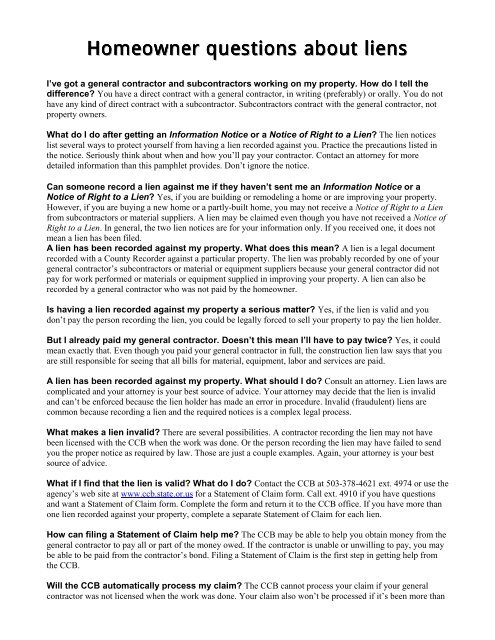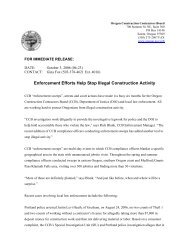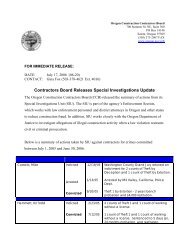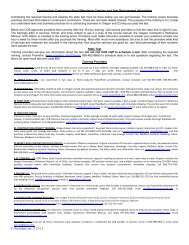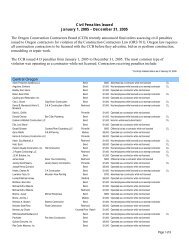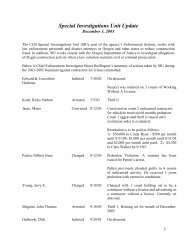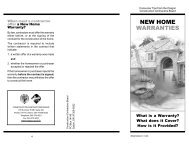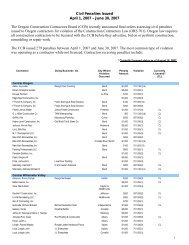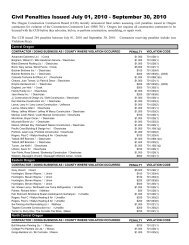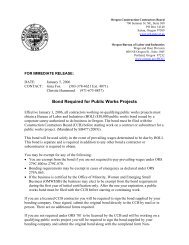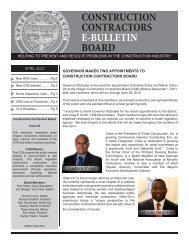Homeowner questions about liens - Construction Contractors Board
Homeowner questions about liens - Construction Contractors Board
Homeowner questions about liens - Construction Contractors Board
You also want an ePaper? Increase the reach of your titles
YUMPU automatically turns print PDFs into web optimized ePapers that Google loves.
<strong>Homeowner</strong> <strong>questions</strong> <strong>about</strong> <strong>liens</strong><br />
I’ve got a general contractor and subcontractors working on my property. How do I tell the<br />
difference? You have a direct contract with a general contractor, in writing (preferably) or orally. You do not<br />
have any kind of direct contract with a subcontractor. Subcontractors contract with the general contractor, not<br />
property owners.<br />
What do I do after getting an Information Notice or a Notice of Right to a Lien? The lien notices<br />
list several ways to protect yourself from having a lien recorded against you. Practice the precautions listed in<br />
the notice. Seriously think <strong>about</strong> when and how you’ll pay your contractor. Contact an attorney for more<br />
detailed information than this pamphlet provides. Don’t ignore the notice.<br />
Can someone record a lien against me if they haven’t sent me an Information Notice or a<br />
Notice of Right to a Lien? Yes, if you are building or remodeling a home or are improving your property.<br />
However, if you are buying a new home or a partly-built home, you may not receive a Notice of Right to a Lien<br />
from subcontractors or material suppliers. A lien may be claimed even though you have not received a Notice of<br />
Right to a Lien. In general, the two lien notices are for your information only. If you received one, it does not<br />
mean a lien has been filed.<br />
A lien has been recorded against my property. What does this mean? A lien is a legal document<br />
recorded with a County Recorder against a particular property. The lien was probably recorded by one of your<br />
general contractor’s subcontractors or material or equipment suppliers because your general contractor did not<br />
pay for work performed or materials or equipment supplied in improving your property. A lien can also be<br />
recorded by a general contractor who was not paid by the homeowner.<br />
Is having a lien recorded against my property a serious matter? Yes, if the lien is valid and you<br />
don’t pay the person recording the lien, you could be legally forced to sell your property to pay the lien holder.<br />
But I already paid my general contractor. Doesn’t this mean I’ll have to pay twice? Yes, it could<br />
mean exactly that. Even though you paid your general contractor in full, the construction lien law says that you<br />
are still responsible for seeing that all bills for material, equipment, labor and services are paid.<br />
A lien has been recorded against my property. What should I do? Consult an attorney. Lien laws are<br />
complicated and your attorney is your best source of advice. Your attorney may decide that the lien is invalid<br />
and can’t be enforced because the lien holder has made an error in procedure. Invalid (fraudulent) <strong>liens</strong> are<br />
common because recording a lien and the required notices is a complex legal process.<br />
What makes a lien invalid? There are several possibilities. A contractor recording the lien may not have<br />
been licensed with the CCB when the work was done. Or the person recording the lien may have failed to send<br />
you the proper notice as required by law. Those are just a couple examples. Again, your attorney is your best<br />
source of advice.<br />
What if I find that the lien is valid? What do I do? Contact the CCB at 503-378-4621 ext. 4974 or use the<br />
agency’s web site at www.ccb.state.or.us for a Statement of Claim form. Call ext. 4910 if you have <strong>questions</strong><br />
and want a Statement of Claim form. Complete the form and return it to the CCB office. If you have more than<br />
one lien recorded against your property, complete a separate Statement of Claim for each lien.<br />
How can filing a Statement of Claim help me? The CCB may be able to help you obtain money from the<br />
general contractor to pay all or part of the money owed. If the contractor is unable or unwilling to pay, you may<br />
be able to be paid from the contractor’s bond. Filing a Statement of Claim is the first step in getting help from<br />
the CCB.<br />
Will the CCB automatically process my claim? The CCB cannot process your claim if your general<br />
contractor was not licensed when the work was done. Your claim also won’t be processed if it’s been more than
one year since you first occupied your new home or one year since the work on an existing home was<br />
substantially completed. And sometimes the contractor’s bond has already been paid to other homeowners who<br />
filed claims before you did.<br />
What else does the CCB need besides a completed Statement of Claim? You need to attach the<br />
following documents to your completed Statement of Claim: 1) a copy of your contract, 2) records of payments<br />
made to your primary contractor, 3) a copy of the Information Notice, 4) a copy of the Notice of Right to a Lien<br />
if you were given one by a subcontractor or supplier, 5) a copy of the lien with the county seal, 6) a copy of any<br />
foreclosure documents you may have received, and 7) copies of invoices from whomever filed the lien (the<br />
subcontractor or material or equipment supplier).<br />
What happens after I send this information to the CCB? The CCB will begin to process the claim if it<br />
is filed within the one-year filing period and if the general contractor was licensed when the work was done. The<br />
processing of your claim may involve an on-site investigation and/or a hearing in Salem. This process can take<br />
several weeks or months.<br />
Suppose I’m faced with a foreclosure of the lien while the claims process is taking place? You<br />
have the right to request from the court a stay (delay) of the foreclosure proceedings until the CCB has finished<br />
processing your claim. If you find yourself in this situation, immediately send the CCB a copy of the foreclosure<br />
document. We will tell you how to request a stay.<br />
If I haven’t paid off the lien, can I still file a claim? Yes. All you need to file a claim is evidence that you<br />
have paid your general contractor and that a lien has been filed against your property because the general<br />
contractor failed to pay a subcontractor or material or equipment supplier.<br />
A contractor filed a lien on my home a year ago and is refusing to take it off. How can I get the<br />
lien removed? Liens expire after 120 days if no lawsuit to foreclose on the lien has been filed and no<br />
extension has been awarded. If no foreclosure lawsuit has been filed, the lien—even though lawfully recorded—<br />
is powerless after 120 days.<br />
I’m buying a newly-built home. How can I protect myself against <strong>liens</strong> that might be recorded<br />
after I take possession? There are several ways. You could wait to take possession until the lien-filing<br />
deadline has passed (75 days after completion of the home). Or you could insist that all persons with lien rights<br />
be paid out of escrow in exchange for signed lien waivers. Or you may want to request a title insurance policy<br />
that includes protection against <strong>liens</strong> filed after the possession date. Your attorney may have other suggestions.<br />
My contractor deliberately did not pay the subcontractor who filed the lien because the<br />
subcontractor’s work was of poor quality. Can I file a claim against the subcontractor? No. You<br />
can only file a claim against the contractor with whom you had a contract. Your general contractor, however,<br />
can file a claim against the subcontractor for negligent or improper work or breach of contract.<br />
The general contractor did not pay the subcontractor because the subcontractor did poor<br />
work. The sub then recorded a lien against the homeowner. What can be done to get me out of<br />
the dispute? The general contractor and sub can file CCB claims against each other and let the CCB resolve<br />
the dispute, rather than involving the homeowner in the lien procedure.<br />
I received a Consumer Notification form from my<br />
contractor. Does this have anything to do with <strong>liens</strong>? No. The Consumer Notification form is a<br />
separate form that contractors are required to give to all prospective residential clients when they bid the job or<br />
at the first contact if no bid is given. It explains what licensing with the CCB means and what a consumer’s<br />
rights and responsibilities are. It has nothing to do with <strong>liens</strong> and does not replace getting either of the<br />
previously<br />
mentioned lien forms.


